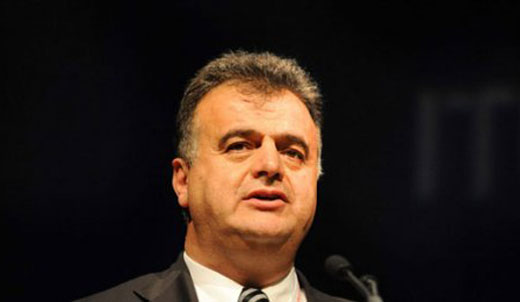
The Palestinian General Federation of Trade Unions (PGFTU) is firmly backing the Palestinian Authority’s bid for the recognition of a Palestinian State by the United Nations. Shaher Sa’ed, its General Secretary, explains its position and sets out the issues on which he believes urgent progress is needed to improve the living conditions of Palestinian workers. Top of the list: the struggle for a minimum wage and real social protection.
Martine Hassoun: How does the political battle by the Palestinian Authority for its recognition as a State concern the trade union that you lead?
Shaher Sa’ed: It is quite simple. Without democracy, without being able to build a modern State, there can be no workers’ rights. The recognition of our inalienable right to self-determination is a prerequisite for economic and social development and the emergence of the real labor legislation that we want so badly. Believe me, when every morning your mind is focused on the fear that you might not get through a check-point, it can be difficult to summon up the enthusiasm to campaign for a labor code that guarantees your rights in relation to your employers. Your concerns are elsewhere…Without a State, without security, what future can the Palestinians look forward to?
MH: If the application is successful, what are the first demands that you would make of your government to improve the living and working conditions of Palestinians?
Shaher Sa’ed: There are enormous needs to be met, on protection from workplace accidents alone. Workers’ rights in this area are almost non-existent. I could also speak about annual leave and sick leave. In all these areas, we are still a long way from applying the principle of “decent work” that the international trade union movement is campaigning for. Much remains to be done but there are two big priorities: the establishment of a minimum wage and the emergence of a real social protection system. These two subjects are closely linked because without social protection, it isn’t possible to defend incomes. And without decent wages, it isn’t possible to defend incomes. And without decent wages, it isn’t possible to create a social protection system. At present, Palestinian workers have no rights on either front. For years we have been trying to discuss the matter in our tripartite negotiations with the employers and the Palestinian Authority. In 2004 we were on the point of establishing a social security system but the World Bank forced us to shelve the whole process.
MH: Why was the World Bank against it?
Shaher Sa’ed: It didn’t like the law we were about to adopt. It didn’t meet its standards… the World Bank was worried about how we would finance our project. We replied, we put forward our arguments. The system that we proposed was financed. But it didn’t want to hear about it. Three years ago we asked if we could resume discussions on the subject. They are ongoing. We have to make progress on this. If we don’t, we risk leaving the Palestinian population destitute. We need the help of the ILO. We need it to advise us and to help put pressure on the Palestinian Authority to make progress. The foundation of an independent tripartite social protection system is fundamental to guaranteeing workers’ rights. It is all the more urgent that private companies appear on the market to offer their services.
MH: What level of minimum salary are you demanding?
Shaher Sa’ed: Without an income of at least 2 500 shekels (500 Euros), no one can live decently in Palestine. That is the minimum level we are demanding. We are campaigning for that now and we would like to have a response to that demand by the time of our Congress next December.
MH: Do you think the Palestinian economy can sustain that level of income?
Shaher Sa’ed: There can be no democracy without justice. A lot of working women today earn less than 1 000 shekels per month (200 Euros). The situation isn’t tenable. Provided we regain our liberty, and have territorial continuity in Gaza and the West Bank, provided we can control our own borders, we have the means to ensure our development. We have rich agricultural resources: olive oil in the West Bank, fruit, vegetables and flowers in Gaza. Our land, our towns, like Bethlehem, Jerusalem or Jericho, provide exceptional opportunities for tourism. We also have a stone industry that the whole world is interested in. We export as far as China and the United States. Provided we have our own State, and can move around and travel freely, the Palestinian economy is viable. We used to have industries and enterprises that were competitive. They were destroyed by the Israeli army, but we can build them again. If the Palestinian internal market were opened up again, it would lead to a flow of production that is currently hampered by check points and the impossibility of trading between Gaza and the West Bank. Unemployment and underdevelopment are not inevitable in Palestine. The Palestinians have a high level of training and education that will enable them to build a modern economy, a democratic State guaranteeing labor right and social rights, respecting the international conventions of the ILO. We don’t have any oil but we have the means to develop, like any other country in Europe or elsewhere.
MH: There have been many proposals for setting up export processing zones on Palestinian territory. What is your position on the subject?
Shaher Sa’ed: We are not against the idea, provided the law is respected. But so far there isn’t a single export processing zone in Palestine. In 2000, two thousand people were still employed at Erez, on the border between Gaza and Israel. This area has been totally destroyed by the Israeli army. And the zone that should exist by Jenin isn’t operational… at the moment all the export processing zones are in the Israeli settlements in the West Bank, and they are constantly developing. In 2000, 10,000 people were employed there. Today there are 35,000, working in unacceptable conditions where employers only recognize rights as and when it suits them: sometimes according to Israeli law, sometimes Palestinian law, sometimes Jordanian law. That is not what we need. What we need is for Palestinian workers to be able to find jobs in places other than the Israeli settlements.
MH: What is the outlook for young graduates, who are currently badly affected by unemployment in Palestine today? Do you have any particular demands concerning them?
Shaher Sa’ed: This is obviously a matter of concern. Every year about 35,000 young people leave the education system, with no prospects. Only about 4,000 to 5,000 of them can hope to work for the Palestinian Authority. Nearly 40 percent of those under 25 are unemployed in Palestine today. Leave, emigrate, try to find a job in Israel: that is their only outlook for the moment. Their future also hangs on whether or not we can create a Palestinian State. And it is for them, and their parents, that we will not cease to campaign for this to become a reality, and that we will take part in all discussions with the employers and the Authority to decide on the parameters.
Reposted from International Trade Union Confederation website.
Photo: Shaher Sa’ed










